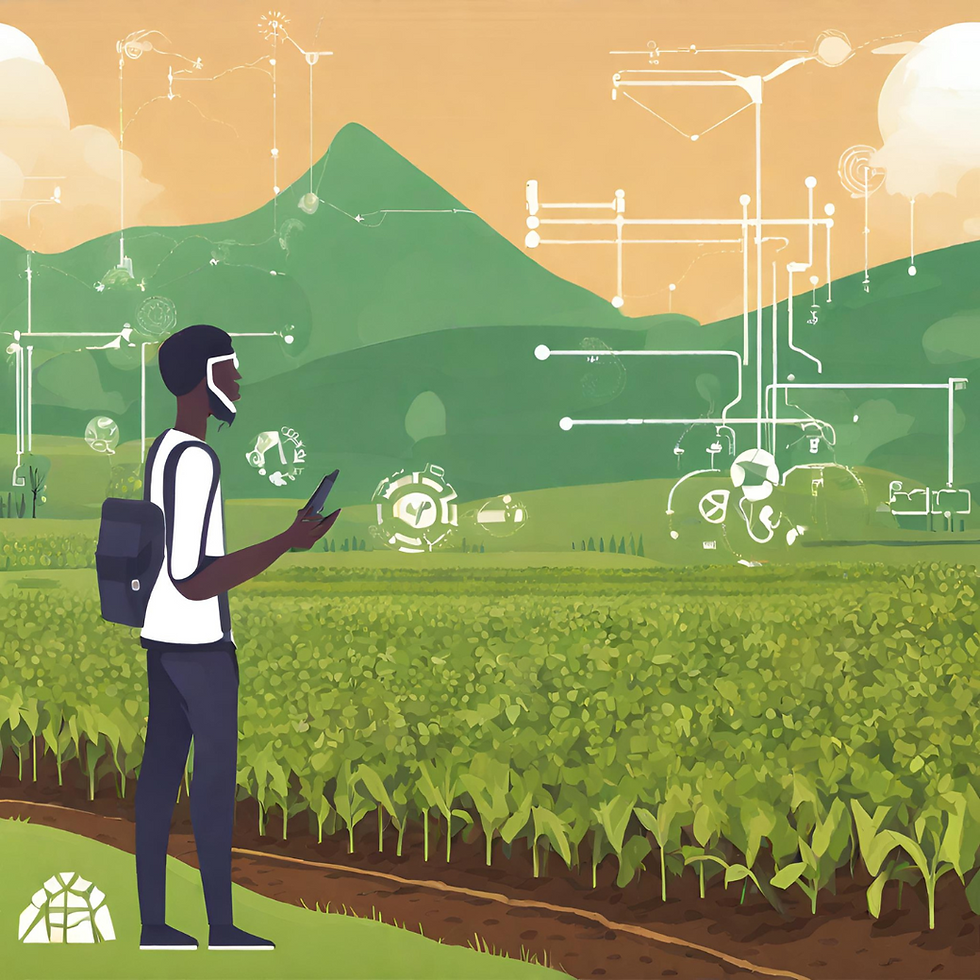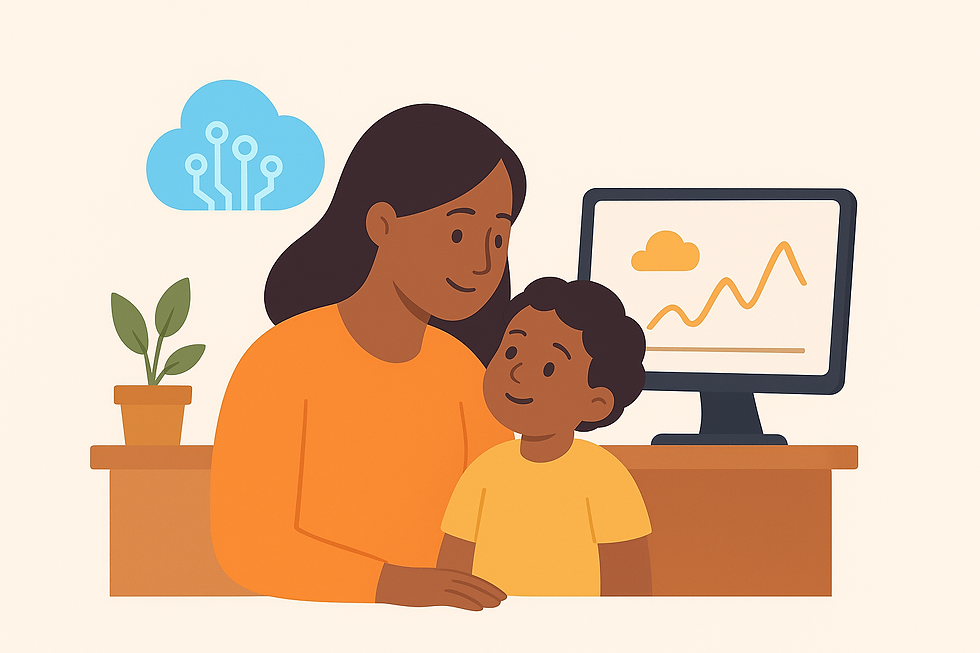The Potential of Artificial Intelligence in Smart Agriculture
- springerpaul4
- Feb 27, 2024
- 5 min read

Image by Canva AI
Written by Aminu Mohammed
Dear friends,
The world is currently experiencing a rapid increase in population growth, resulting in a greater need for food production to feed the growing populace. The Food and Agriculture Organization has projected that the global population will reach 9.73 billion by the year 2050. However, the challenge of feeding this vast population has been further compounded by climate change, which is currently affecting many regions of the world, particularly in Africa, Asia, and South America. Developing countries are the hardest hit by the climate catastrophe, as billions of hectares of land have been degraded, making previously fertile lands less productive.
As a result of climate catastrophe, the poor condition of the soil has caused farm yields to decline significantly, which has had a negative impact on the livelihoods of millions of people, particularly in developing countries. Climate change has affected farming and livestock production, resulting in poor harvests and low income for smallholder farmers, while millions of households have been plunged into poverty.
The traditional system of agriculture is insufficient for meeting the increasing food demands of the growing population worldwide. This has led to the need for smart agriculture, which involves the use of artificial intelligence to enhance productivity and boost food security in developing countries.
Adopting artificial intelligence in agriculture is essential to tackle this issue and reverse the poor living conditions of farmers in developing economies. Smart agriculture involves the use of new technologies such as artificial intelligence and machine learning in agricultural and livestock production to ensure maximum utilization of resources, enhance efficiency, and reduce environmental impact. The integration of artificial intelligence in smart agriculture is envisioned to help combat climate change and promote environmental sustainability, resulting in sustainable agriculture and rural transformation in line with the United Nations' sustainable development goals.
Artificial intelligence a boost to farmers’ revenue
Sustainable farming practices can help combat food insecurity and mitigate the climate crisis. By using technology to reduce the use of fertilizers, pesticides and other farm inputs, farmers can improve their yields while protecting the environment. For example, artificial intelligence systems like machine learning, robots and drones can help farmers manage resources more efficiently. Artificial intelligence can be used to identify and destroy weeds and pests, as well as monitor the application of fertilizers, pesticides and soil properties. Agricultural drones can also be used to detect diseases, predict crop yield and monitor livestock health. By using the relevant data derived from these technologies, farmers can improve their productivity, increase their income and contribute to the growth of the economy. Ultimately, the use of appropriate technology can improve the livelihoods of farmers and their families, while also benefiting the national economy.
Environmental Impact and Sustainability
Climate change poses a major challenge to the economic well-being and livelihood of smallholder farmers, particularly in some developing countries in Africa such as Nigeria, Mali, Kenya, Niger, among others. Millions of farmers in these countries depend on their farmlands for their sustenance, but traditional farming methods have had a negative impact on crop production and the environment. This has further worsened poverty and dependence, due to declining incomes for farmers resulting from poor soil fertility and a lack of innovation in farm management. The use of technology can help to mitigate these challenges in agriculture and minimize the environmental impact. For example, artificial intelligence and machine learning can assist in carrying out farming activities with minimal use of water, organic fertilizers, and pesticides. Additionally, these technologies can help farmers to monitor their crops more effectively, reducing the risk of crop loss, and helping with climate adaptation and environmental protection.
Impact of Agro tech-start-ups
Several agricultural start-ups in India and Kenya have taken the initiative to support smallholder farmers in adapting to climate change and improving their income through the use of artificial intelligence tools. The AI4AI Saagu Baagu is an excellent project implemented in Telangana, India, benefitting approximately 7,000 chili farmers through the use of artificial intelligence to improve their earnings. Saagu Baagu (meaning agricultural transformation) is an initiative introduced by the state government of Telangana in partnership with the World Economic Forum to transform the agricultural landscape in the zone through the deployment of artificial intelligence and machine learning to increase crop yield and minimize costs.
The introduction of artificial intelligence tools, such as the WhatsApp chat box developed by Digital Green, an agriculture start-up company, utilizes timely notifications and videos to enable farmers to monitor their crops effectively by understanding the stages of their maturity. Moreover, the introduction of such relevant machine learning tools in the local language of the area assisted farmers in the application of fertilizers and pesticides as well as provided adequate knowledge about the composition of the soil.
Similarly, in Kenya, an agro-tech startup called Lentera Africa is helping farmers to adapt to climate change through technology. Through the use of artificial intelligence, the tech startup has empowered farmers to improve their yield in many communities around Nairobi. Lentera provides farmers with timely information like weather forecasts and how to manage crops through mobile apps and text messages. The company uses satellite images derived from drones to provide farmers with timely information on when to begin planting seeds, monitor soil moisture and rainfall, and manage pests through a mobile app. With the provision of such qualitative data by the tech startup, farmers are able to make the required adjustments in view of the changing climate. Currently, no fewer than 200 smallholder farmers in Kenya are using Lentera services and have experienced a 50% increase in farm yield.
Challenges in the use of Artificial Agriculture
Artificial intelligence is considered to be a helpful aid for farmers, rather than a replacement for their work. However, there are concerns that implementing this technology may result in job loss for farm laborers and worsen urban migration in developing countries. Migrant farm workers may be particularly affected, as they could lose their source of income due to the push for more efficient and cost-effective farm management. This challenge could be tackled through periodic training of farmers on the usage of artificial intelligence tools for effective farm management.
Additionally, the lack of internet connectivity in remote areas especially in Africa, makes it difficult to adopt new technologies such as drones, robots, cameras, and sensors. These tools rely on internet access to function, which is not always available in remote locations. Moreover, the high cost of these technologies makes it challenging for smallholder farmers to afford them, further widening the gap between those who can and cannot access these technological advancements. Elon Musk's Starlink, despite being expensive at the moment, has the capacity to provide internet access to remote locations and bridge the gap. In the future, Starlink's services may become more affordable, and its massive deployment across remote locations can make it accessible to rural farmers, helping to improve their crop yields.
The high cost of these technologies means that non-profit organizations, such as MI4People, and researchers need to come up with open-source solutions that are accessible and available to the public. This will make it easier for those who cannot afford expensive tools to benefit. MI4People is currently working on an initiative that will help farmers understand the nature of their soil through the use of machine learning. The Soil Quality Evaluation System, a project of MI4People, will serve as a game changer in terms of costs. It enables farmers to have adequate information about the properties of their soil, helping them make appropriate decisions on how to plant their crops and how to protect them from pests.
Future potentials
It is believed that with appropriate technologies, it will be possible to fight global hunger and feed the expanding population in the future. Anyone can become a grower of various crops in remote areas across the world, as long as they have access to the right technology and an internet connection to enable them to connect online.
Best regards
Your MI4People-Team



Comments